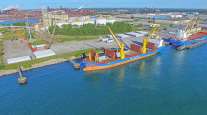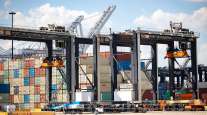Senior Reporter
FMC's Carl Bentzel Worries Port Congestion May Impact Peak Shipping Season

[Stay on top of transportation news: Get TTNews in your inbox.]
With the increasing number of cargo ships on the Atlantic and Pacific coasts waiting to be unloaded nearing 150, Federal Maritime Commission member Carl Bentzel believes the upcoming peak season for retailers could be extremely challenging and the already tight supply chain could be stressed to its limits.
Bentzel said dozens of cargo ships have changed their routes and moved to Atlantic ports because of concerns over labor issues on the West Coast.
“I think we’re going to have some challenges,” Bentzel said. “The reports I’m hearing from carriers is that the levels remain extremely high and congestion is a challenge, maybe abating a little bit on the West Coast because cargo has been shifted to the East Coast, but it’s still very, very difficult. It’s clear that steps were taken to do more on the East Coast because of the concerns.”

Bentzel
The International Longshore and Warehouse Union and the Pacific Maritime Association are in contract talks in San Francisco, and a tentative agreement has been reached on some issues, including medical and health care. Larger topics, including salary, benefits and work rules, still are being negotiated. Both sides have insisted there will not be a labor disruption as talks continue, although agreement on the long-term deal may not come until later in the fall.
Also, on Aug. 29, three of the 12 unions negotiating with the nation’s largest freight railroads announced they have reached a tentative agreement. The deal gives workers raises of 24% over the five years of the contract covering 15,000 members of the International Association of Machinists, the Transportation Communications Union and the Brotherhood of Railway Carmen.
“It seems like there’s some progress on both fronts, and so I think that’s a good a good sign,” Bentzel said.
But talks are ongoing with the other unions, and the sides are facing a Sept. 16 deadline to reach an agreement under the Presidential Emergency Board that has been tasked with negotiating a settlement.
The union and the employer have agreed to not discuss negotiations in the media, and any rumors about what happens at the negotiating table are second, third or fourth hand. The union has no comment on unsourced rumors except to say that the parties continue to negotiate. — ILWU Coast Longshore Division (@ilwulongshore) August 19, 2022
Now port volumes on the West Coast, with the exception of the Port of Oakland, are on track to exceed 2021’s record level, even with the some traffic moving to the Atlantic Coast. Facilities on the Eastern Seaboard also are blasting through the previous year’s record levels with the Port of Savannah, Virginia’s port complex, the Port of Charleston, the Port Authority of New York and New Jersey and the Gulf of Mexico’s Port Houston seeing exceptionally heavy traffic volume through the spring and summer.
“Our assessment was in 2021, that container shipping container imports had gone up 27% over pre-pandemic times. So, you know, they’re higher than they were last year,” Bentzel said. “Houston is high. Savannah is high. Charleston is high. New York is high.”
Bentzel said the offshore vessel count has ranged from 130 to 150.
The White House Port and Supply Chain Envoy and Port of Oakland officials meet to discuss supply chain solutions. Read more here #portenvoy #ports #AAPA_Seaports #whitehouseportenvoy #GeneralLyons #supplychain #logistics #maritime https://t.co/JtxxOTn7S2 — Port of Oakland (@PortofOakland) August 31, 2022
The Port of Oakland reported July volumes dropped nearly 30% because of several days of protests by truck drivers angry over the Supreme Court’s decision not to intervene involving the case of California’s Assembly Bill 5.
Bentzel said cargo ships also are waiting for longer periods before they can be assigned a slot and eventually be brought into the port to be unloaded.
“There’s evidence that these kind of these containers are dwelling much longer,” he said. “So they’re waiting in the port, waiting for a spot to get to longer than ever by triple the time.”

Siamak Azmoudeh of SkyBitz discusses the rise of the smart trailer and why the industry standard is shifting toward more sensors, more data and more business intelligence. He joins host Seth Clevenger to explain the evolution of trailer telematics. Tune in above or by going to RoadSigns.ttnews.com.
He added that supply chain problems are being made worse by the continuing shortage of warehouse space in much of the country, but especially near major cities and in particular in California, where the vacancy rate for that industry has lingered at less than 1% for more than two years. For the area east of Los Angeles, truck and intermodal traffic also has substantially increased.
He said that’s putting more stress on the supply chain because 2½ years into the pandemic and the related economic disruption, the supply chain still is significantly out of balance.
“A lot of the warehousing is not available; it’s used up. I think the industry has shifted to secure more cargo because of concerns that they won’t be able to get everything that they need,” Bentzel said. “We’re still seeing, then, not enough cargo in certain areas to be delivered. And you still see it when you go to the grocery store, you’re like, ‘hey, we’re low on certain products.’
“It’s just that we have such a large backup. But I don’t see congestion changing for the balance of the year.”
Want more news? Listen to today's daily briefing below or go here for more info:




